Accommodation is one of the most essential things you must prepare for when you travel. Having a safe roof over your head is a basic necessity and tops the list of priorities as a traveler. In today’s markets, there are many options to choose from when it comes to finding accommodations. You can stay with friends, stay at a hostel/guest house, or rent a room or an entire space through Airbnb. However, one popular accommodation option is to remain in a hotel. In a previous post, I discussed my experience renting an Airbnb in Marseilles. Although my experience was unpleasant, I plan to write about the pros and cons of renting an Airbnb over staying at a hotel. However, this post will focus on staying at a hotel.
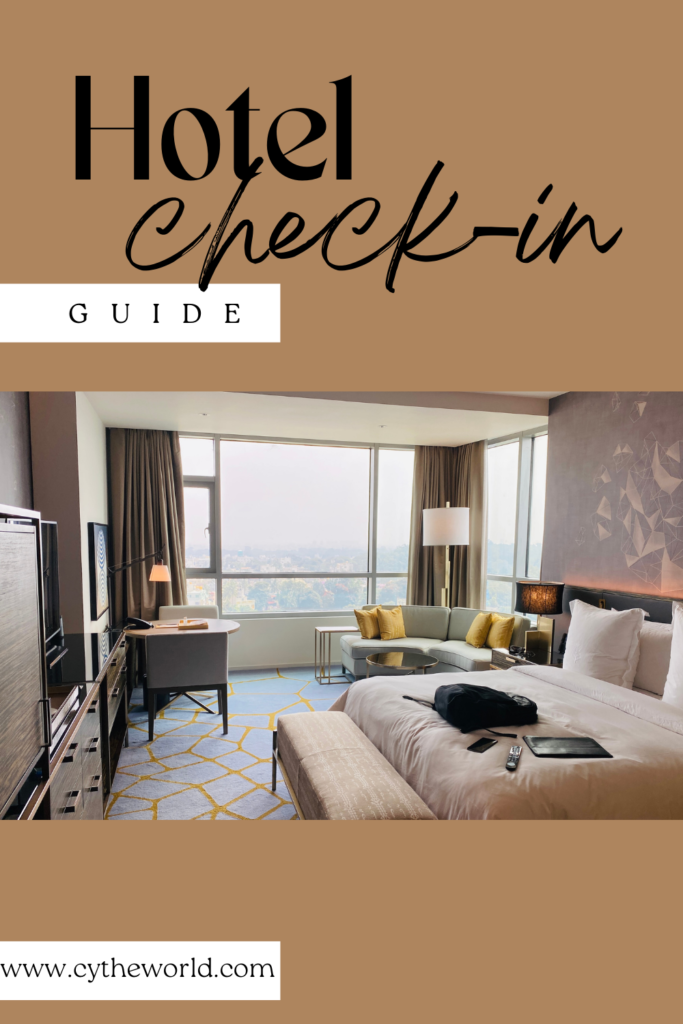
One of the reasons I prefer staying at hotels is because I feel safer than in any other accommodation. I’ve stayed with extended family, family friends, a hostel, and Airbnb(twice), and none of the options are tailored to my wants and needs, like staying at a hotel. Although I always felt safe staying at hotels, there are precautions to take to ensure your safety and have an enjoyable experience. Hence, these are the seven must-do things when you check in at a hotel. Before diving into these seven strategies to ensure a safe and enjoyable experience, let’s discuss why hotels are the preferred option for many travelers.
Why Should You Stay At a Hotel?
The idea of staying in a hotel as we know it today started in 1768 in Exeter, England. Although having a facility to host guests has been around since the world began (Think about Abraham or Jesus), the Industrial Revolution helped the mass construction of hotels in Europe and North America. The goal for hotels was to provide a safe home away from home where travelers could relax, have a roof above their heads, and have the same comfort they would have if they were in their homes. This goal remains until today, and with continued improvements to the hotel industry, hotels are still a safe accommodation option for many travelers.
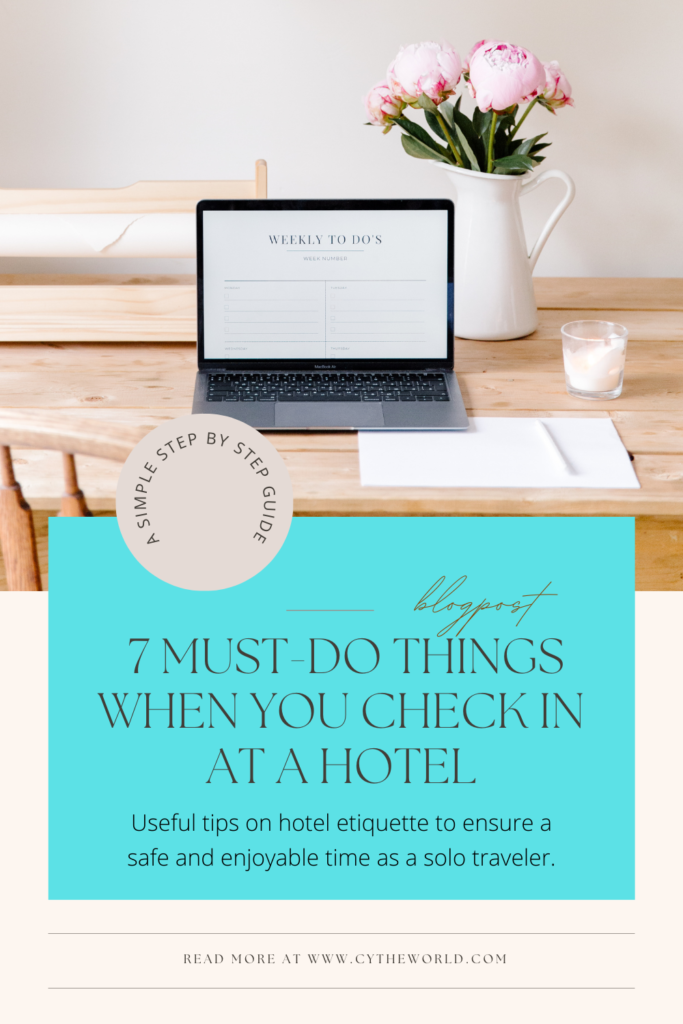
As a frequent traveler, when I research to find accommodations, I look for a place where I can feel safe, with good services and the comfort of being in my home away from home. Although one can say that renting an Airbnb is the same as staying in a hotel room, psychologically, when at the Airbnb facility, I felt like I was in someone else’s house. Therefore, I behaved in a way where I felt like a stranger to where I was supposed to lay my head. I felt uncomfortable in a space where I did not know what I was allowed to do and what I wasn’t. Plus, accommodation with a front desk and security guards is vital in a city where you do not know who or what to expect. After experiencing a break-in in Marseilles, it became evident that no preliminary research can help you face inconvenience when you do not have anyone to rely on. Therefore, I love the community that the hotel atmosphere provides. The customer service that hotels offer allows you to meet new acquaintances and creates an environment where, in case of emergencies, you will have someone to rely on for help and physical and emotional support.
Downside of Staying with Friends/Family Members
Some travelers prefer staying with friends or family if they know someone who lives in the country they are visiting. There are upsides to staying with friends and family when you travel. The first upside to staying with friends or family members is you save on accommodation. You don’t have to worry about paying for a hotel, an Airbnb, or a hostel. You have a secure place to stay in your head, surrounded by people you know and trust. Your friends can be your tour guides, giving you a first-hand life experience in that country. Aside from saving from paying for accommodation, you can also save on meals. However, even with the benefits I listed, there are still downsides to staying with family and friends.
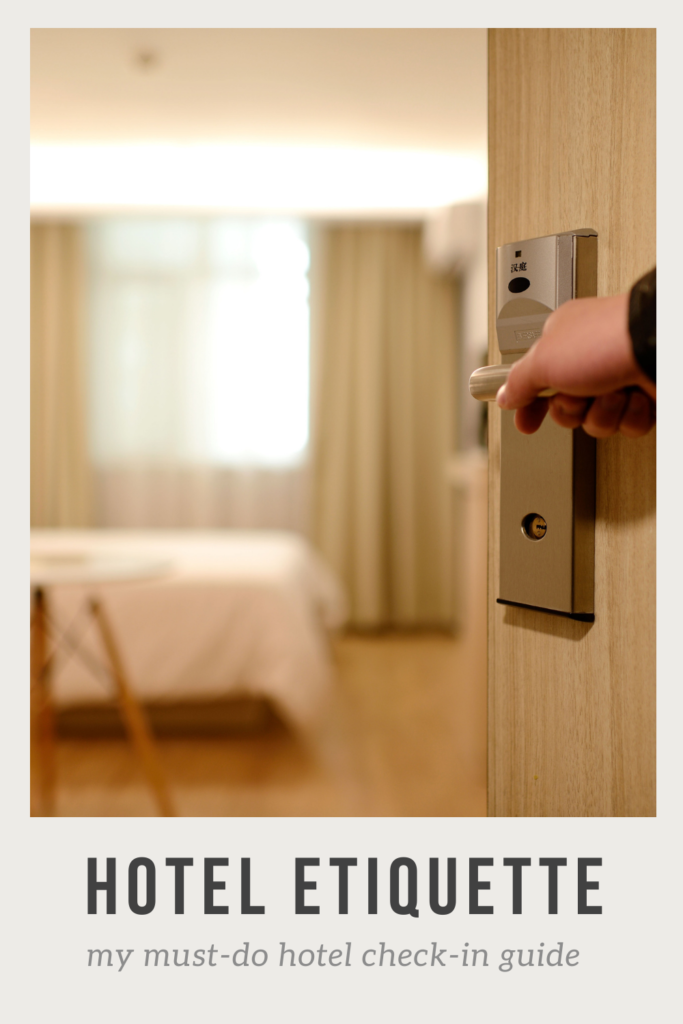
One of the downsides is not having the freedom to move the way you want to shift. Depending on different cultures, there are things you need to abide by when you live under someone else’s roof. If the house members wake up early in the morning, you must comply with that out of respect. You sometimes have to walk on eggshells not to offend or disrespect anyone’s space. Secondly, the other downside of being with family and friends is that you may not see everything you want. You will not have an unbiased, objective perspective of the country. When I went to France and asked my cousins to go to the Eifel Tower, they questioned, “Why do you want to go there?” Imagine my surprise to have cousins who were born in France but have never been to Versailles, Champs de Mars, or the top of the Arc de Triomphe.
Although surprised, I thought about how I had never seen the Statue of Liberty or other American attractions as an American. But in America’s defense, America is a big country, and although I have not been to the Statue of Liberty of the Grand Cayon, I know every tourist spot in my State. When I host people from other countries, I want to take them to tourist places. When people visit me in Rhode Island, I bring them to the State House, Colt State Park, and Newport’s mansions. However, I have noticed from living in Europe that locals are not enthusiastic about their attractions. There is a disconnect between locals and their tourist sites, and as travelers, you want to experience those sites and may feel conflicted about pushing your host to do something they find pointless.
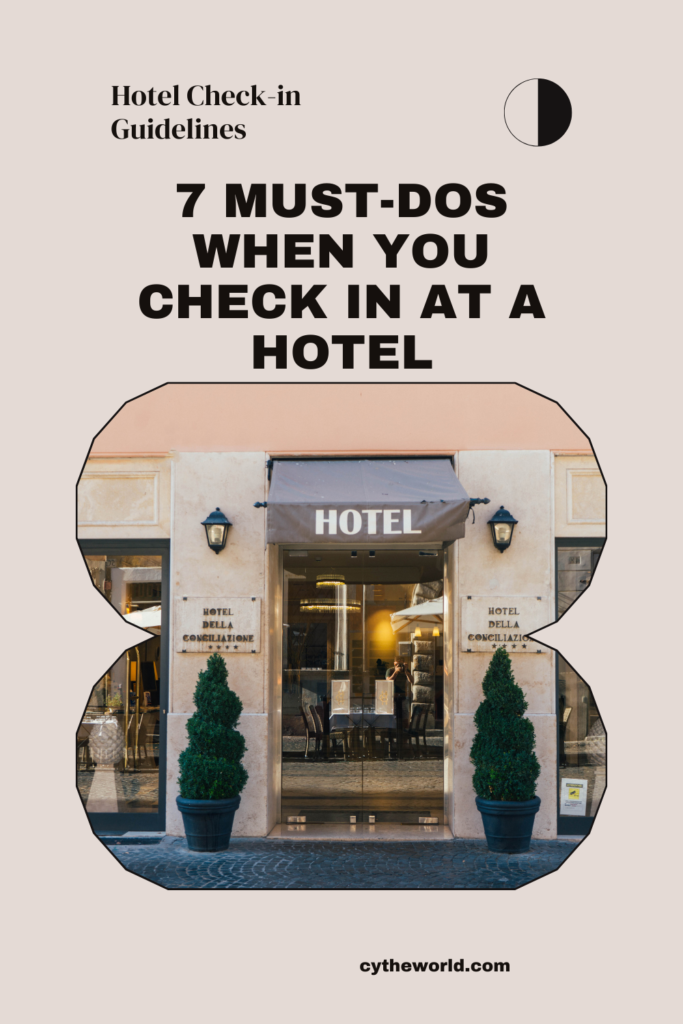
When I lived in France and Belgium, where I had family members, I needed to live alone to enjoy myself and learn about these countries beyond their biases. When I would go to Paris for the weekend, I stopped staying with my family members because I knew I could not see and do the things I wanted. My experience would be limited, and I risked having a limited viewpoint of the city. That is why I would stay at hotels and away from family members because although I was there to study and interact with my extended family members, I was still a foreigner and a tourist. There were experiences I wanted to have. Trying to maintain my plans with their lack of affection for the experiences I wanted was a constant battle I had to face.
Staying at the hotel allowed me to be myself as if I were in my own home. I did not have to fight for the bathroom space. I was able to eat what I wanted and when I wanted. I came and went as I pleased without feeling like I was on a curfew out of respect for my extended family. Although I contributed to the groceries while staying with them, I could not open the fridge, eat, and cook as I pleased when hungry. I had to wait for my aunt to cook, and everyone was at the table to eat. At the hotel, I could sleep late and wake up later. I did not have to wake up early as I did at my aunt’s to help with chores because it is customary for a girl to wake up early in an African household. I always choose to stay at hotels because of the liberties staying at a hotel brings rather than being with family or friends. The peace of mind is worth more than staying at an Airbnb or with family and friends. However, there are must-do things to ensure your safety while staying at a hotel. Hence, seven must-dos when you check in at a hotel.
- Set your boundaries & Communicate your needs with the concierge.
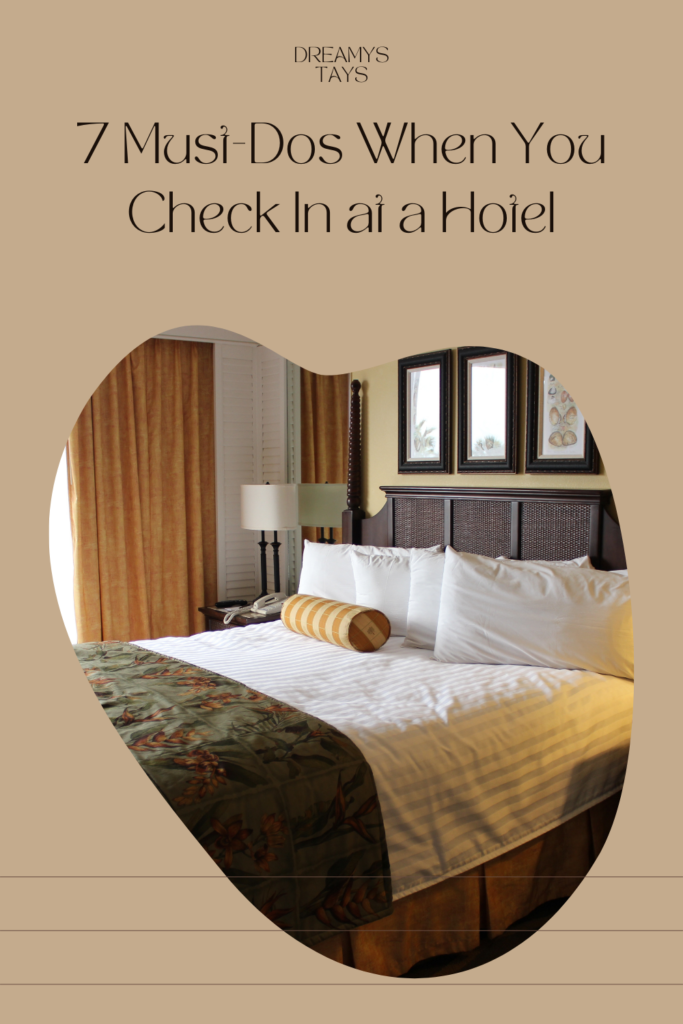
The first thing I do when I check in at the hotel is to set my boundaries. When I check in, I let the concierge know what I need. I tell them my boundaries after introducing myself and giving them my cards. I informed them I would not need housekeeping to clean my room. I ask for extra towels, tea, coffee, and other necessities. I ask about what services they provide, such as room service or tourist attraction discounts they offer. Asking for the hotel’s services is to have options to compare what the hotel offers and what I can find outside the hotel. Setting my boundaries allows me to set the tone for my accommodations.
As a solo female traveler, ensuring my security is primal to me. I like to let the concierge know my boundaries so they know how to interact with me. Because I set my boundaries, I understand I will not have anyone in my room, whether or not I am there. Before someone comes to my room, they will alert me in advance. Knowing that we verbally agreed on what I wanted gives me the peace of mind that the possibility of unpleasant surprises is low. Therefore, I recommend you do the same when you first check-in. Some hotels have environmental initiatives where you can get a discount if you don’t use housekeeping services daily. Other discounts are from partner vendors that the hotel has with other businesses, so letting the front desk know what you need and want when you first get there will ensure you have a safe and enjoyable time at the hotel and throughout your trip.
- Check out the EXIT emergency plan in your room & on your floor.
When you check into a hotel, the second thing to do is learn all the emergency exit plans. When I walk away from the concierge, I look at the EXIT emergency plans that the hotel has. I glance at the elevator safety guide, the hall safety guide, and the room safety guide. Knowing where all the emergency exits and safe guidelines help you create a safety guide for yourself. Regardless of what may happen, you already have your action plan. You know where to go and how far your room is to the nearest exit so that even if there is an electrical emergency where there is no light, you have an idea of how to navigate out to safety.
- Check your room for any anomalies.
After you enter the room, the next thing to do is to check your room for anomalies. When you get in the room, go through the entire room to see if something is out of order or if you have everything you need for the time you will be there. Check everything from the fridge, the bathroom, and the coffee bar. Because I made it known that I do not want housekeeping to come to my room, I need to ensure everything is in order as soon as I enter. I like to check if I have all the necessities. I check whether the phone works or does not work. I check all my devices’ Wi-Fi connections to ensure everything is all set. I check the TV and fridge. I count how many bottles and what beverages I find inside the fridge to ensure I know what I will drink and what I will not. I do so because the hotel charges you for certain beverages, and I am the type of traveler who likes to do some light grocery shopping, so I want to know what belongs to the hotel and what belongs to me. Another thing I started doing when I checked for anomalies was checking under the bed to ensure the room was empty(I am a bit paranoid).
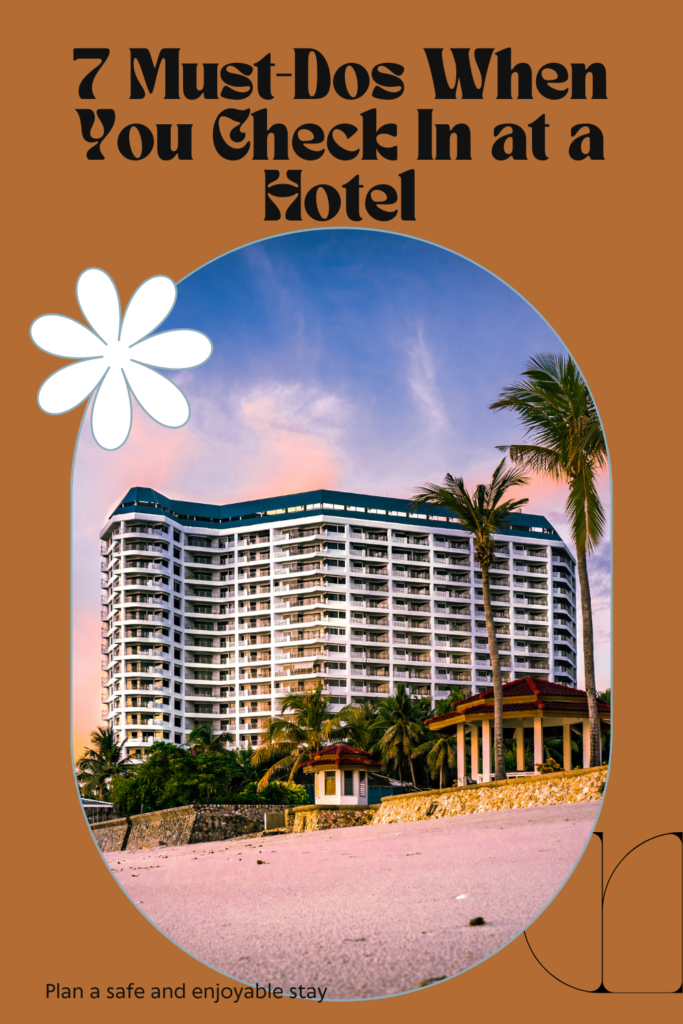
- Secure the Safe.
Another must-do thing when you check into your room is to set the pin for the safe/vaults. It is a crucial step when you start unpacking because you will keep your valuables in the safe. When placing your pin, I set different pins before I can reassure myself that the safe is safe to put my valuables in. Because I like to travel light when I am abroad, I only take a small purse where I keep my wallet, which contains cash, one credit card, and my phone. Since I usually have a digital copy of my identification card, I leave my physical ID in a safe. Because of the experience in Marseilles, where people broke into my Airbnb, I would like to move the vault to a location that even hotel staff would not see. I move it away from its original position because although keeping your valuables in a safe is safer, safes are not entirely free of break-ins. There are ways to open a safe without using the pin you set, so setting the pin is one of many steps to ensure your valuables are secure.
- Always have a “DO NOT DISTURB.”
I started implementing the “Do Not Disburd” sign whenever I stayed in a hotel a year ago. When my mother and I went to Italy, we were so tired that we did not hear anything when a hotel staff knocked on our door. He thought he could come and let himself in since there was no response, scaring us. Although we know he did not mean to interrupt or scare us, going through that made me take security seriously.
I now place a “Do not disburt” sign as soon as I settle in my hotel room to prevent interruption and because I no longer like having staff coming to clean the room every day. Although it is rare to have a staff steal from you or have an intruder when you are staying at a hotel, it is not impossible. Having the “Do not disturb” sign ensures that staff do not enter and lowers the risk of having an incident where someone does not come to your room without your knowledge.
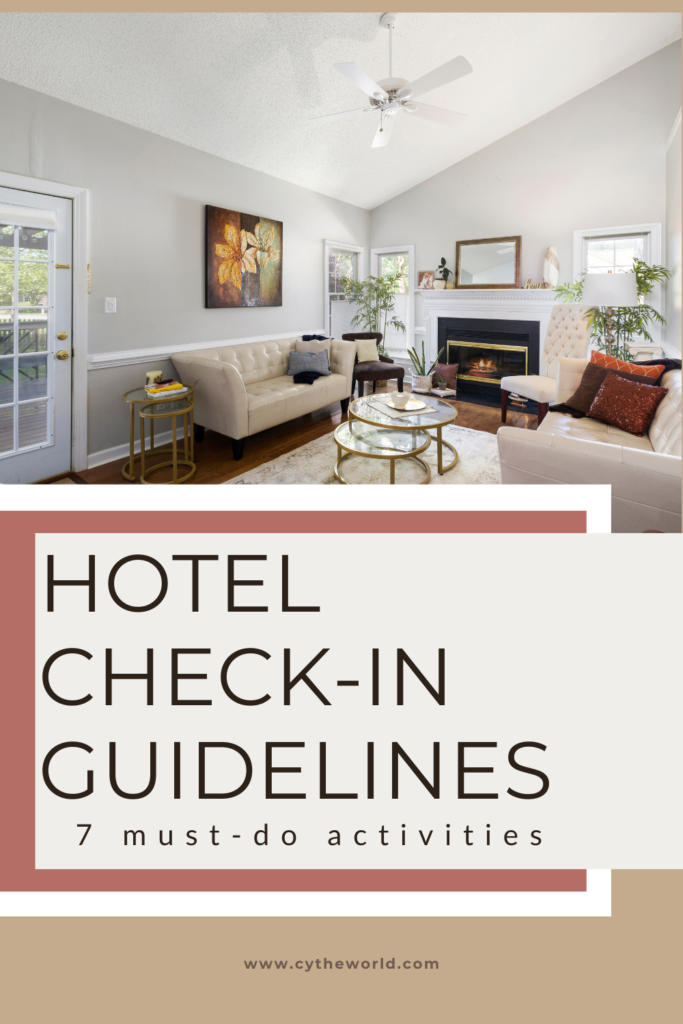
- Build a relationship with hotel staffers.
Another must-do when you get settled at a hotel is to get to know the staff. The hotel staff are your first point of contact when you check-in. They are there to ensure you have a pleasant time because they understand their importance in your travel journey. Hotel staff receive training on how to be welcoming, accommodating, and problem solvers. Often, they not only represent the hotel they work at, but as locals, they represent their countries, cities, cultures, and traditions. In my experience, they have been my tour guides, giving me a brief history of their city, recommending things to do, what to see, and local attractions unknown to many tourists, and finding discounts for me.
You will meet a different staff team depending on the time you check-in. The morning staff is different from the afternoon or evening staff. Therefore, knowing the staff who work there and their schedules is vital. When you meet the entire team during your stay, they also get to understand you, creating a meaningful relationship to ensure your safety. The staff will know who is missing in an emergency because everyone can see who you are. As a solo female traveler, I want to be noticed and known by the staff for safety because they are part of my rescue committee if something happens. One time, people had to evacuate the hotel I was staying in, and I was not present during the incident. The concierge, because he knew my face and had casual conversations with me, knew that I was missing from the group, so he contacted me on my cell phone to ask if I was sleeping and did not hear the announcement. I told him I had already gone on my excursion before his shift started, explaining why he did not see me. That is why it is crucial to build a relationship with hotel staff.

- Keep a clean & neat room.
Finally, it is vital always to have a clean and neat room. Keeping a clean room is another safety must-do when you check in at the hotel. As mentioned above, I do not let housekeeping into the room, so I have to clean up after myself during my stay. Keeping your hotel room clean and neat is essential for various reasons. Firstly, it helps you stay organized and calm during your stay. When you have a clean and tidy room, you’ll be able to find your belongings quickly, and you’ll feel more relaxed and at ease. A cluttered and dirty room, on the other hand, can cause anxiety and stress, making it difficult to enjoy your stay. Keeping your room clean and neat will create a peaceful environment that will help you sleep better at night and feel refreshed in the morning. Another reason to keep your room clean and tidy is for safety. In an emergency, a clean space will allow you to evacuate without hurting yourself. You can easily access your belongings and leave without falling because of clutter. Secondly, a clean and neat hotel room can help avoid unwanted pests and bacteria. Therefore, you must clean up after yourself for your health’s sake. Thus, keeping your hotel room clean and neat can ensure your health and well-being.
In conclusion, staying at a hotel is appropriate if you want to have the comfort of your home away from home. It provides you with the freedom to move as you please. At a hotel, you have the convenience of safety. Communities of other travelers surround you, and the hotel staff provides a family atmosphere. Although staying at a hotel has been a great option in my experience, there are check-in must-dos that every traveler should follow. From setting boundaries to securing the safe and keeping your room neat and clean, these must-do check-in practices will ensure you have a safe and enjoyable stay when you choose a hotel as your accommodation option.
Please let me know your other must-do advice when you check in at a hotel. Thank you for your time and consideration.
Until next time, have a great stay!
Xoxo,
Cy
Leave a Reply
You must be logged in to post a comment.